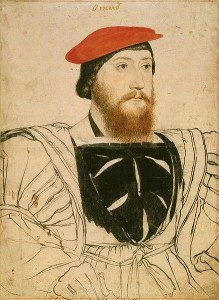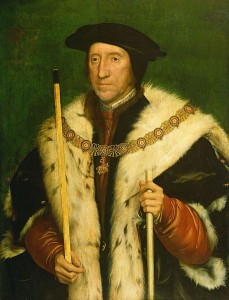
In 1521, after spending 8 years on the continent, Anne Boleyn was recalled to England. Although Francis I, King of France, was worried that the recall of his wife’s lady-in-waiting and various English students in Paris “seemed to indicate an English intention to make war on France”1, Cardinal Wolsey assured the French King that Anne Boleyn was being recalled to marry. Here is a report of this from the Spanish Calendar of State Papers:-
“The ambassadors complained that Boleyn’s daughter, who was in the service of the French queen, had been called home, and said this was not a sign of continued friendship. The cardinal said that he himself was responsible for her recall, because he intended, by her marriage, to pacify certain quarrels and litigation between Boleyn and other English nobles.”2
This report was dated the 17th January 1522 and Eric Ives points out that seeing as the ambassador who made the original complaint on behalf of Francis I left France before the 6th January 1522 we can be sure that Anne left France in 15213. Anne had been recalled from France to marry James Butler, son of Sir Piers Butler, but who on earth was James Butler?
The Butlers of Ireland
If you remember my article on Thomas Boleyn, Anne’s father, you may remember that Thomas’ mother was Lady Margaret Butler, the daughter of Thomas Butler, the 7th Earl of Ormond. Well, on the 3rd August 1515, Thomas Butler died. He had reached the wonderful age of 89 but he left no legitimate offspring to inherit his title, as he had only daughters, and instead he left the Boleyns (the family of his daughter Margaret) and the St Legers (the family of his daughter Anne) as joint heirs-general. Eric Ives explains that Henry VIII’s favour led to Thomas Boleyn being granted the livery of his mother’s estates within 4 months but that “to be granted and to occupy were two very different things, at least in Ireland, where the rights of the heirs-general were obstructed by the late earl’s cousin and heir-male, Piers Butler, who had been acting for years as the representative of the absentee earl.”4. Piers Butler began styling himself the Earl of Ormond even though a hearing in November 1516 had seen the Boleyns and St Legers prove their case. The problem was that although Thomas Boleyn had the support of Henry VIII, Piers Butler had the backing of the Irish Lords and was pushing for the case to be tried in front of a common-law jury where he was bound to win. A tricky situation seeing as England did not want to upset Butler and the Irish Lords.
Marriage Plans

In September 1520, Henry VIII wrote to Thomas Howard, the Earl of Surrey, and Anne Boleyn’s uncle, who had been appointed Lord Lieutenant of Ireland “to ascertain whether the earl of Ormond is minded to marry his son to the daughter of Sir Thomas Boleyn”5 to unite the two families and put an end to the troubles. On the 6th October 1520, Surrey and the Council of Ireland replied that they thought “it would be advantageous if a marriage were solemnised between the earl of Ormond’s son, now in England, and Sir Thomas Boleyn’s daughter”6. In November 1521, Wolsey wrote to Henry VIII from Calais saying, “On my return I will talk with you how to bring about the marriage between his son and Sir Thos. Boleyn’s daughter”7, so it is evident that the marriage plans were progressing at this point. What is interesting is that James Butler was actually being brought up in Wolsey’s household and in his November 1521 letter to the King, Wolsey also mentions that the marriage plans “will be a good pretext for delaying to send his son over.”8 As Ives points out, it almost appears that James Butler was being kept hostage!
It is likely that Anne was sent a letter recalling her from France in early December 1521, after Wolsey had arrived back in England and discussed matters with the King. Anne Boleyn left France to marry James Butler but the marriage was not to be. We do not know the ins and outs of what happened and why the marriage did not take place, but Eric Ives believes that it was Sir Piers Butler who put an end to the negotiations, “presumably because Boleyn made difficulties”8. Ives also ponders whether Wolsey never meant the marriage to take place and that the negotiations were simply “a long-term inducement to the Butlers to behave”9. Whatever the truth of the matter, in 1522, on her return to England, Anne Boleyn was expecting to marry an Irish Lord and spend the rest of her life in Ireland, she could have had no inkling about how things were actually going to turn out!
James Butler, 9th Earl of Ormond
As we know, Anne Boleyn ended up marrying Henry VIII, but what about James Butler? What happened to him? Well, in 1532 he married Lady Joan Fitzgerald, daughter and heiress of James Fitzgerald, 10th Earl of Desmond, and the couple went on to have seven sons, one of whom married the granddaughter of Elizabeth I’s spymaster and Secretary of State, Sir Francis Walsingham. In 1539, on the death of his father, James became 9th Earl of Ormond (confirmed by an Act of Parliament on the 6 November 1541) and Earl of Ossory and in the 1530s, in Ireland, he was also given the offices of Lord-Treasurer, Lord-Deputy and Admiral of the Kingdom. In 1535, he was made Viscount Thurles and in 1545 he led Irish troops in Scotland, in the service of Henry VIII. James Butler died on 28th October 1546 after being poisoned at a dinner at Ely House, Holborn, London. He was not the only victim, his steward and at least sixteen servants were also fatally poisoned. James Butler’s body was buried at the Church of St Thomas d’Acres in Cheapside, London, but his heart was interred at St Canice’s in Kilkenny10. His widow, Joan, went on to marry courtier Sir Francis Bryan and then, after his death, her cousin, Gerald Fitzgerald, 15th Earl of Desmond. Joan was known as a peacemaker in Ireland and Elizabeth I relied on her to keep the peace between the warring Butlers and Fitzgeralds. Joan died on 2nd January 1565 and with the peacemaker gone, war broke out and there was the Battle of Affane between the two families, with Joan’s son, Thomas, as the victor.
In Part 6 I will look at Anne’s arrival at the English Court.
Notes and Sources
- Calendar of State Papers, Spain, Further Supplement to Volumes 1 and 2, 17th January, The Ambassadors in England to Charles V
- Ibid.
- The Life and Death of Anne Boleyn, Eric Ives, p372 in Notes, note 71
- Ives, p34
- LP iii. 1004
- Ibid., 1011
- Ibid., 1762
- Ibid.
- Ives, p36
- Ibid.
- Library Ireland article – An article on James Butler, 9th Earl of Ormond, with information taken from Ormond, Duke of, Life 1610-’88: Thomas A. Carte, M.A. 6 vols. Oxford, 1851